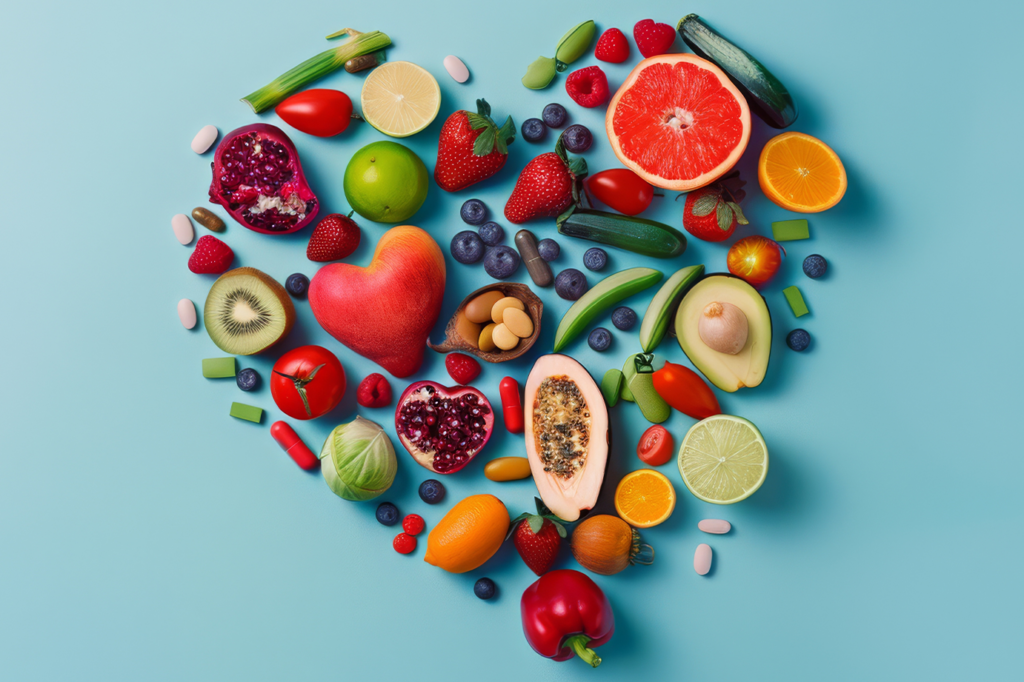Maintaining heart health requires a combination of supplements, exercise, and a nutrient-rich diet. This guide explores how these elements work together to promote cardiovascular wellness.
Key Supplements for Heart Health
Omega-3 Fatty Acids
- Benefits: Reduces the risk of heart disease, lowers triglycerides, and supports artery health (Harvard).
- Sources: Fatty fish (salmon, mackerel), flaxseeds, walnuts, and supplements.
- Dosage: At least 500 mg EPA/DHA per day.
Coenzyme Q10 (CoQ10)
- Benefits: Supports energy production in heart cells, lowers blood pressure, and reduces oxidative stress (NCBI).
- Sources: Meat, fish, and supplements.
- Dosage: 100–300 mg daily, with better absorption in ubiquinol form.
Magnesium
- Benefits: Regulates heart rhythms and blood pressure, reduces stroke risk (PubMed).
- Sources: Leafy greens, nuts, seeds, whole grains.
- Best Forms: Glycinate and taurate for heart health.
Vitamin D & K2
- Benefits: Reduces arterial calcification and supports heart function (PubMed).
- Sources: Sunlight, egg yolks, fatty fish, fermented foods.
- Why Together? Vitamin K2 directs calcium to bones, preventing artery buildup.
Heart-Healthy Exercise
Aerobic Exercise
- Benefits: Reduces heart disease risk, improves circulation (Cambridge).
- Examples: Running, cycling, swimming.
- Recommendation: 150 minutes of moderate exercise weekly.
Strength Training
- Benefits: Lowers blood pressure, improves cholesterol (NCBI).
- Frequency: At least two strength sessions per week.
Mind-Body Exercises
- Benefits: Reduces stress, supports heart health (PubMed).
- Examples: Yoga, tai chi, mindfulness exercises.
Heart-Healthy Diet
Fiber
- Benefits: Lowers cholesterol, reduces heart disease risk (PubMed).
- Sources: Oats, legumes, fruits, whole grains.
- Goal: At least 25 grams daily, with a focus on soluble fiber.
Healthy Fats
- Benefits: Supports heart health, reduces inflammation (PubMed).
- Sources: Olive oil, avocados, nuts, fatty fish.
- Limit: Saturated and trans fats.
Organic, Whole Foods
- Benefits: Reduces exposure to harmful pesticides, may offer higher nutrient levels (PubMed).
- Sources: Fresh, unprocessed foods.
What to Avoid for a Healthy Heart
Excess Salt
- Impact: Raises blood pressure, increasing heart disease risk.
- Limit: Less than 2,300 mg daily.
Refined Sugar & Processed Foods
- Impact: Linked to inflammation and heart disease (PubMed).
- Alternatives: Natural sweeteners, whole foods.
Smoking & Excess Alcohol
- Impact: Increases heart disease risk (NCBI).
- Tip: Reduce alcohol intake and seek support to quit smoking.
Sedentary Lifestyle
- Impact: Increases cardiovascular risk (PubMed).
- Solution: Stay active, incorporate movement throughout the day.
Optimizing heart health involves a holistic approach, combining supplements, exercise, and diet. Always consult a healthcare provider before making significant changes to your lifestyle. By prioritizing natural heart-healthy habits, you can enhance overall well-being and longevity.
Resources:
(1) https://pmc.ncbi.nlm.nih.gov/articles/PMC8850984
(2) https://pmc.ncbi.nlm.nih.gov/articles/PMC8389239/
(3) https://pmc.ncbi.nlm.nih.gov/articles/PMC5852744/
(4) https://pmc.ncbi.nlm.nih.gov/articles/PMC10255064/
(5) https://pmc.ncbi.nlm.nih.gov/articles/PMC2754502
(6) https://pmc.ncbi.nlm.nih.gov/articles/PMC10343346
